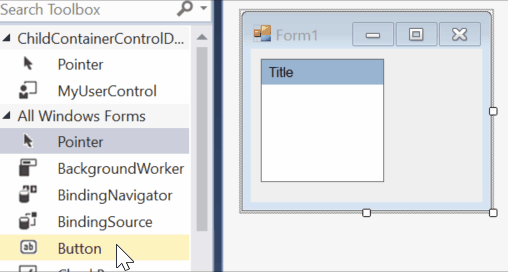UserControl with header and content - Allow dropping controls in content panel and Prevent dropping controls in header at design time
I wrote User Control (yay!). But I want it to behave as a container. But wait! I know about
[Designer("System.Windows.Forms.Design.ParentControlDesigner, System.Design",
typeof(IDesigner))]
Trick.
The problem is - I don't want all of my control to behave like container, but only one part. One - de facto - panel ;)
To give wider context: I wrote a control that has Grid, some common buttons, labels and functionalities. But it also has a part where the user is supposed to drop his custom buttons/controls whatever. Only in this particular part of the control, nowhere else.
Anyone had any idea?
You should do the following :
- For your user control, you need to create a new designer which enables the inner panel on design-time by calling
EnableDesignModemethod. - For the inner panel, you need to create a designer which disables moving, resizing and removes some properties from designer.
- You should register the designers.
Example
You can read a blog post about this topic here and clone or download a working example:
- r-aghaei/ChildContainerControlDesignerSample
- Download Zip

Code
Here is the code for different elements of the solution.
Your user control
[Designer(typeof(MyUserControlDesigner))]
public partial class MyUserControl : UserControl
{
public MyUserControl()
{
InitializeComponent();
TypeDescriptor.AddAttributes(this.panel1,
new DesignerAttribute(typeof(MyPanelDesigner)));
}
[DesignerSerializationVisibility(DesignerSerializationVisibility.Content)]
public Panel ContentsPanel
{
get { return panel1; }
}
}
Designer for the inner panel
public class MyPanelDesigner : ParentControlDesigner
{
public override SelectionRules SelectionRules
{
get
{
SelectionRules selectionRules = base.SelectionRules;
selectionRules &= ~SelectionRules.AllSizeable;
return selectionRules;
}
}
protected override void PostFilterAttributes(IDictionary attributes)
{
base.PostFilterAttributes(attributes);
attributes[typeof(DockingAttribute)] =
new DockingAttribute(DockingBehavior.Never);
}
protected override void PostFilterProperties(IDictionary properties)
{
base.PostFilterProperties(properties);
var propertiesToRemove = new string[] {
"Dock", "Anchor", "Size", "Location", "Width", "Height",
"MinimumSize", "MaximumSize", "AutoSize", "AutoSizeMode",
"Visible", "Enabled",
};
foreach (var item in propertiesToRemove)
{
if (properties.Contains(item))
properties[item] = TypeDescriptor.CreateProperty(this.Component.GetType(),
(PropertyDescriptor)properties[item],
new BrowsableAttribute(false));
}
}
}
Designer for your user control
public class MyUserControlDesigner : ParentControlDesigner
{
public override void Initialize(IComponent component)
{
base.Initialize(component);
var contentsPanel = ((MyUserControl)this.Control).ContentsPanel;
this.EnableDesignMode(contentsPanel, "ContentsPanel");
}
public override bool CanParent(Control control)
{
return false;
}
protected override void OnDragOver(DragEventArgs de)
{
de.Effect = DragDropEffects.None;
}
protected override IComponent[] CreateToolCore(ToolboxItem tool, int x,
int y, int width, int height, bool hasLocation, bool hasSize)
{
return null;
}
}